Hello, readers of Hive!
I would like to share with you my opinions on some books I recently finished.
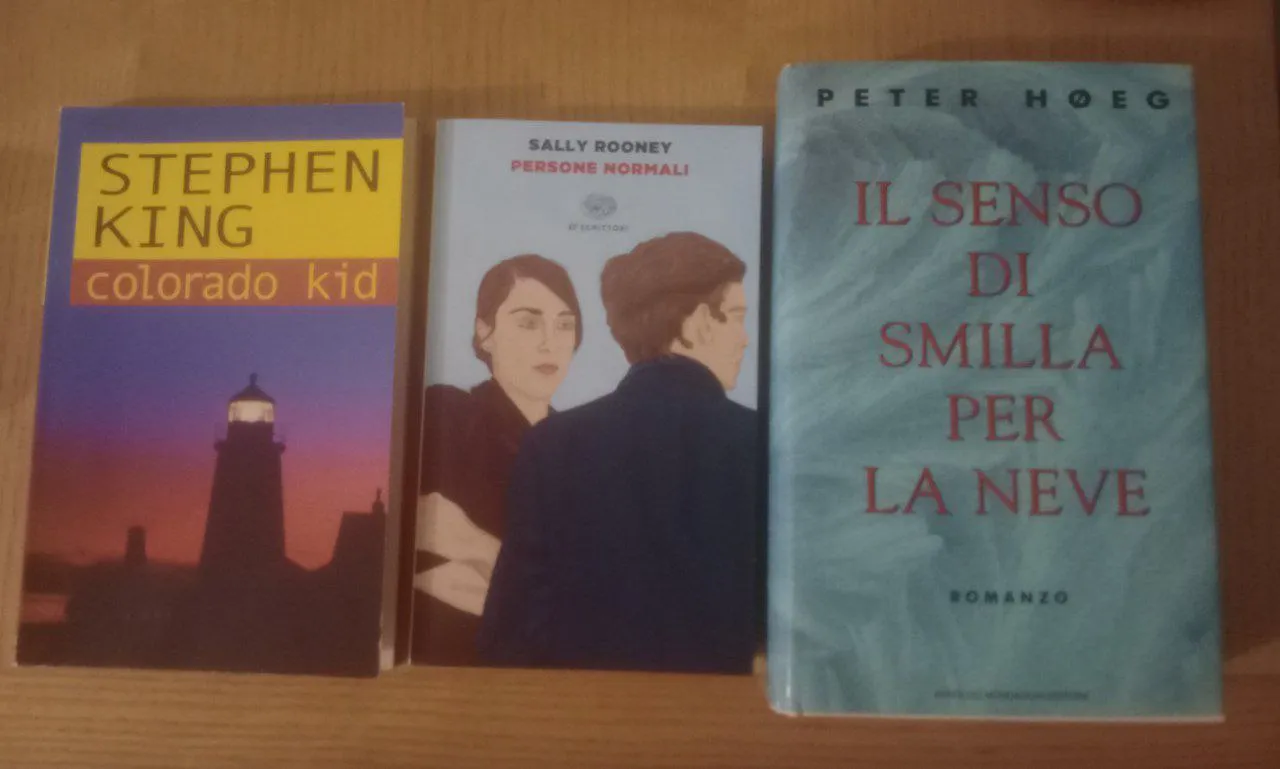
"Smilla's Sense of Snow" by Peter Høeg : 7 / 10 🙂
"Colorado Kid" by Stephen King : N/A / 10 ⁉️
Those few that haven't been completely put off yet by my use of emojis will find my review for each of these books down in this blog post in the same order as they appear in this list.
I've been wanting to write reviews for a while now but it's always so difficult to describe a story without giving away what happens. I will do my best not to spoil too much for you.
I will also include small excerpts from the various books in the form of images.
These little snippets should give you a better idea of the style, the characters and the vision behind the book.

Normal People 👫
About the author
Sally Rooney is an Irish writer born in 1991, making her a notable millenial author.
She received her higher education in Dublin's Trinity College. At first her focus was on politics but eventually shifted towards literature.
An outspoken person and not without wit if you consider that already in university she was famous for her debating skills on a national level.
As a writer, she published her first novel in 2017 and followed it up in the next year with the publishing of the book in question, "Normal People". Both received important awards, critical acclaim and even got made into TV series.
I first learned about Sally Rooney during the pandemic as she was a trending author and common talking point of many book influencers on the internet at the time. I'm sure many of you might have been made aware of her works through similar means.
Plot and summary
The story is set in 2011 and quickly unravels over the next few years. It describes the complicated lives of two teenagers: Marianne and Connell.
We quickly learn that Marianne is not well liked. In fact, she has no friends to speak of and is often the target of cruelty, in more ways than one. Quite a symphatetic character, she never had a boyfriend or even much of a friend.
Her family is quite rich and they have an house cleaner, who just happens to be Connell's mother.
Connell is a bright and balanced kid, in spite of growing up without a father and limited economic means. He is in many ways the opposite of Marianne as he's naturally charming and well liked by his peers. He's much more successful than Marianne in his romantic life.
Often picking up her mother from work, Connell is bound to spend some time with the social pariah that is Marianne. In private, he's kind and respectful enough of her but doesn't offer her much more than that as he deems that intimacy and frienship with Marianne might be too scandalous and could ruin his social status in school. Such teenage drama! 🤣
Do not be put off, however, by it. It might seem a bit of an edgy premise aimed to please young readers but I think this is definetely a book that a lot of adults will enjoy too.
A cursory glance at the back of the book will inform you that the story revolves around the seemingly never-fully-attained love story between the two of them. Someone will make a move and they will grow to be intimate but there'll be an important caveat to this first version of their unusual relationship and heartbreak will eventually ensue. 💔
Both Connell and Marianne have interest and a gift for literature and the humanities. After finishing high school they both end up frequenting Trinity College in Dublin. They'll take some of the same classes, go to the same parties. They'll both go back to their hometown and bump into one another. They'll both go on to have different but still complicated lives.
They'll both go through changes and have to learn hard lessons.
They'll make mistakes and pay for them, grow to have regrets.
There will be times when you'll be screaming at these two characters, wanting them not to leave and have a conversation but this piece of fiction is as real as life. And in real life we misinterpret things, have insecurities. Sometimes we say too much and sometimes we say too little. Sometimes, in the moment, we just don't know what to say.
It's a classic "will they, won't they?" romance story and this dynamic is the main feature driving the plot forward.
If the hook sounds interesting to you I encourage you to take a chance on this book!
Style and structure
The book is relatively short and an extremely voracious and committed reader might be done with it in a single day. However we're not all fast readers and have different quotas of time we can assign to our leisurly reading anyway.
Personally it took me about a couple of weeks to finish it, devoting some minutes or even an hour per day to the book. Skipping it altogether on some days.
Later in the story there's a part with a focus on depression and mental health. As I got there I felt this growing sense of danger for the characters and I couldn't stop myself from finishing the rest of the book in one sitting.
Each chapter is rather small, definetely readable well within an hour and is almost invariably structured in the same way as the others.
They all describe a specific point in time when something pivotal happens, often ending in a big revelation and you'll be compelled to continue. But the next chapter will then jump ahead in time, often weeks or months, ending in an undefined future. This cheeky narrative device confers great momentum to a story that would otherwise have been much less captivating.
You'll be asking questions and demanding answers and Sally Rooney will take her time to provide them. Going on tangents and ellipses. The characters' introspective nature will make them reminisce on their past and sometimes only through that you'll be allowed to know exactly how they ended up where they are presently.
Throughout all this Connell and Marianne are equals for the sake of the economy of the story.
Everything is told in the third person and they'll take turns in taking the center of the stage in a way that parallels well their unstable lives and uncertain relationships.
The dialogues happen quickly and there's little punctuation to them. Quotation marks are definetely not Sally Rooney's friends. The author will be demanding your attention often enough when it comes to this. I wasn't too used to this style and I found it a bit jarring, at times, as I'm sure it was the case for many others as well.
It does, indeed, slow down the reading and makes sentences as well as silences much more impactful.
Here's a sample. If you manage to get your hands on the book just flip to a random page and you'll see for yourself that the style is unquestionably always the same as this.
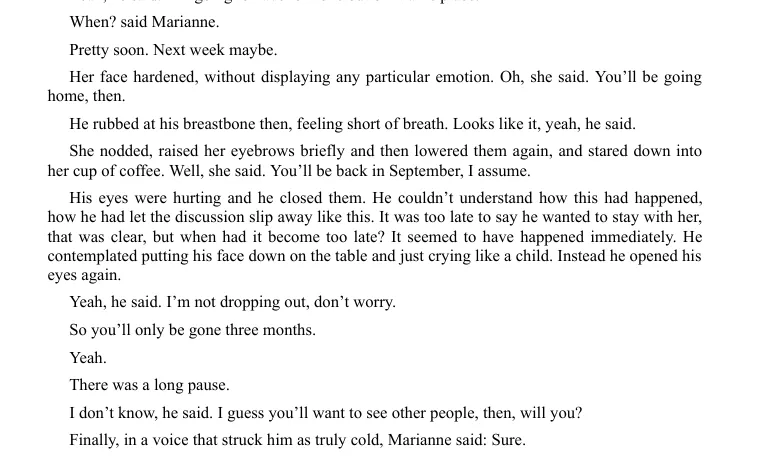
Rooney's prose is a bit sterile and often lingers over seemingly mundane and irrelevant actions. Small glances and touches almost become an extension of dialogues. There's a lot of emotion however, especially coming towards the big set-pieces Rooney engineered.
Just consider that the basis for this novel was a short story named "At the clinic" where the two lovers would reminisce over the turnmoil of their relationship and the author later expanded this year by working backwards in time to build more of a story around it.
Every once in a while the writer will be able to condense in just a short sentence relatable thoughts you might not have heard someone share before in such a way and other things of beauty. It's in these moments that her sensibility really shines through and even just for this reason alone I'd be interested in reading more of Rooney's works. Here's an example I liked.

This is ultimately the comforting power of fiction of making us feel less alone in the world.
Another passage I think many might enjoy is the following.

Themes
Surely Sally Rooney draws inspiration from her own life when it comes to lay down a path for her characters. They walk in the same halls and frequent the same classes she did. Marianne even becomes a member of the univeristy's debate team, same as Rooney.
The parties they go to, the media they consume, the social preoccupations they have, the trips throughout Europe and the carreer choices.
It wouldn't be wild to suggest that the author channeled herself and her educated cohorts into the young characters that populate this book.
When it comes to the protagonists both do well in school and almost unnervingly effortlessly become top of their classes.
Connell fits into the stereotype of the tormented soul, someone who's too smart and sensible for his own good. He's often overcritical of himself to the point of lacking confidence.
Marianne's wit is different. After years of being judged by others she claims she doesn't care in the least about their opinions nor wants to impress them but at the same time doesn't relish in her intellectual superiority. She lives in her own world where she allows only a select few to enter while everyone else not deemed worthy is treated with benign indifference and a special kind of coldness.
Discounting the easy notion that this is a book about love it could still be said that it deals as well with trauma and how it affects us, with the long journey of healing. It's a book about sexuality, deviancy (or what might be perceived as such) and taboos. About what we like is not always a reflection of our morality.
There's focus on guilt, depression, mental health and existentialism.
The book deals with how people in our lives shape us, for better or worse.
For instance Connell claims that if it were not for Marianne he might have ended up somewhere else altogether.
However it's also largely a story that wants to warn us about how often we let the opinions of others influence our lives.
Connell doesn't want to be seen with Marianne, scared that his friends would make fun of him or judge him, in spite of the natural connection he feels with her.
As for Marianne, throughout the book's narration there's a peculiar focus on what she eats and it's being suggested that she progressively starves herself in order for others to appreciate her more for her looks.
Other characters suffer too while seeking the approval of others and trying to fit in.
Another theme the book touches on is money. The protagonists have hugely different lifestyles and priviliges in that sense. While Connell has to work odd jobs throughout the story and is often in financial trouble Marianne never has to work. This may or may not become a plot point down the line.
More than just money, it's about the incoherence of modern society and the social issues that stem from it although I'm not sure this theme is explored on a significant enough level. It really just feels more like a series of vignettes and impressions in that sense.
There'll be a time where Connell and Marianne will be amazed by the presence of wastefully uninhabited buildings, which they will agree to blame capitalism since they both declare themselves as communists in their teenage years.
Other times it will be the unproductive and seemingly unnecessary office jobs some of the characters have to take in order to support themselves through university.
Connell will have to switch jobs a few times as many businesses in his hometown seem to fail one after the other.
In a sense money is just a facet of the ever-returning theme present here of societal constructs and the expectations we fear others might have of us and how that influences our choices in life.
Conclusions
I have a mixed, but overall positive, opinion of this book but I think it might be a divisive one for many.
The pacing of it felt great and it often feeds off powerful, raw emotions.
That, combined with the structure and the emotional investment in the characters, made it really easy for me to keep reading.
On the other hand the subject matter is a bit of a wild experiment by Rooney.
She clearly set out to tell this story about a blossoming teenage love in an objective and matter-of-fact way, tantalizing us by having us be the impotent spectators of these characters' ineptitude.
That, on its own, is a nice idea however this detached style didn't allow me to understand why the characters would make some of their decisions and I would have prefered to get to know them better at some points. They were indeed a bit puzzling at times and even after having finished the whole story I admit I have a hard time justifying entirely some of their decisions. If you've read the book I'd love your input on that matter.
A final point of contention might be the ending. If there's a fil rouge somehow connecting these three books is indeed the fact that they all end mysteriously (each in their own way).
I wasn't particularly bothered by this feature and I think it ultimately stays true to the overall style of the book and what it tries to achieve.
As I said there's things to like and dislike and I expect this one book to be quite polarizing.
If this was on your radar you can now make a more informed decision, hopefully.

Smilla's sense of snow ❄️
About the author
Peter Høeg was born in Copenaghen in 1957. He's had an eclectic carreer and perhaps most notably, for the sake of reviewing this book, before becoming a published author he's been known to have worked as a sailor.
With respect to the second part of the story you'll have to become acquainted with nautical terms as well as with the various roles of the crew of a ship and the architecture and engineering of an ionclad vessel that will brave the waters of the coast of Greenland.
Høeg must have drawn inspiration from his own life at sea to populate this boat with characters that come from all over the world and all have different aims and ambitions.
Surely the author is most famous for "Smilla's Sense of Snow", published in 1992.
Only two years afterwards the book had already been adapted into a movie.
His second most famous novel is "Borderliners" and from reading the summary of it I think some of the themes and ideas explored in that book are not completely dissimilar from the ones you can find in this one. There's a huge focus on the outcasts of Danish society and a skepticism towards science and modernity.
Plot and summary
Smilla Qaavigaaq Jaspersen is the daughter of a rich Danish doctor who fell in love and married a Greenlandic tribeswoman only to separate from her and move back to his country two years later.
Smilla spends her youth in Greenland with her mother but after her death her father brings her back to Copenaghen to amend for having left them and provides for her.
We eventually learn this through recollections and dialogues since the story starts when Smilla is already an adult.
Stuck between two different worlds and without too many people to care for her, Smilla is a pathetic character. She seems to live a humble and lonely life with only a few things bringing her joy.
In spite of her troublesome past she has been a mathematician and studied physical models that explain the structural behavious of snow and ice, the features she remembers most fondly of her native homeland. We learn that she never formally finished her studies but still somehow managed to publish some works and participate in several scientific expeditions to her beloved Greenland.
She's an activist and a rebellious figure on behalf of her native region and as she takes it too far she's estranged from most Danish organizations and finds herself trapped in a country she doesn't seem to belong to.
She's expelled from several schools in her youth and struggles to fit into society.
To link this book to other great nordic noirs, there's a lot of Lisbeth Salander in her. 🐉
You just have to replace hacking skills with a love for mathematics and the ice and you might just get an idea of what the protagonist is like.
With no romantic partner to speak for, Smilla lives on her own in an housing complex for migrating Greenlanders. She's however, a mother figure of sorts for a young and neglected boy of similar heritage.
This young boy, Esajas, lives in the same building and is often roaming around freely as her mother is an alcoholic who hardly provides for him.
Smilla nourishes Esajas who reluctantly accepts her company and the defeaning silence of their conversations is enough to brighten both their days and give meaning to their lives.
All this ends when, at the beginning of the story, Isaiah dies by falling off the snow-covered roof of the building he was supposedly playing on.
Not much thorough investigative work is done with respect to this tragedy so the private citizen Smilla Jaspersen, struck by grief, takes it upon herself to uncover the truth.
Her keen "sense of snow" allows her to understand from the get-go that the kid couldn't have fallen if he was just playing. The footprints and crumbled up patches of snow don't add up and she thinks something more sinister might have taken place.
Things quickly escalate after that. Smilla will go on to do all kinds of detective work and as she discovers more pieces of information about the suspected cover up a circle starts enclosing around the Cryolite Corporation of Denmark, a succesful Danish company that carries out mining operations.
Eventually hunted by the police, as well as by more mysterious forces, Smilla goes on the run and manages to escape just in time on a ship headed to Greenland which promises to be a good lead to find out the truth behind this puzzle with several moving parts.
Style and structure
This is by a good margin the longer book of the three that I'm reviewing and my estimate is that it took me about a month or even more to get from cover to cover. Consider that I took my time with it.
It is divided into six main parts, each comprising several chapters. These chapters are usually short enough that you might read several in a single reading session. The above summary pertains to the first three of these section which are thematically grouped together as they're all set in "the city", undoubtedly Copenhagen.
The remaining chapters are about Smilla's seafaring journey back to Greenland on her quest for truth and vengeance.
The story is entirely told from Smilla's point of view. We're only ever allowed to know as much she knows at a given time. Sometimes, mostly in the beginning, there'll be recollections of what her life was like in the past.
The narration is not without humor, often thanks to Smilla's very critical perception of life and Danish society. Here are some examples of that.


The style is sometimes poetic and it's definetely in this dimension that the book really seems to belong. Smilla could be raving about the beauty of math and great thinkers of the past one moment, longing for quiet and the snow the next one.
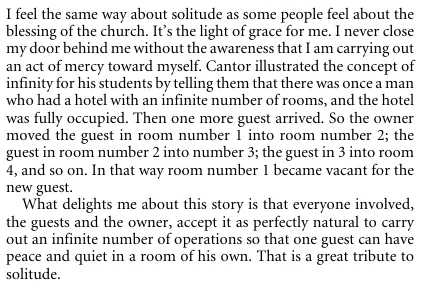
Themes
The first thing that comes to mind if I think of this book is the strong sense of place that permeates it, something that can be the selling point for many that like discovery of other cultures and adventures carried out through literature.
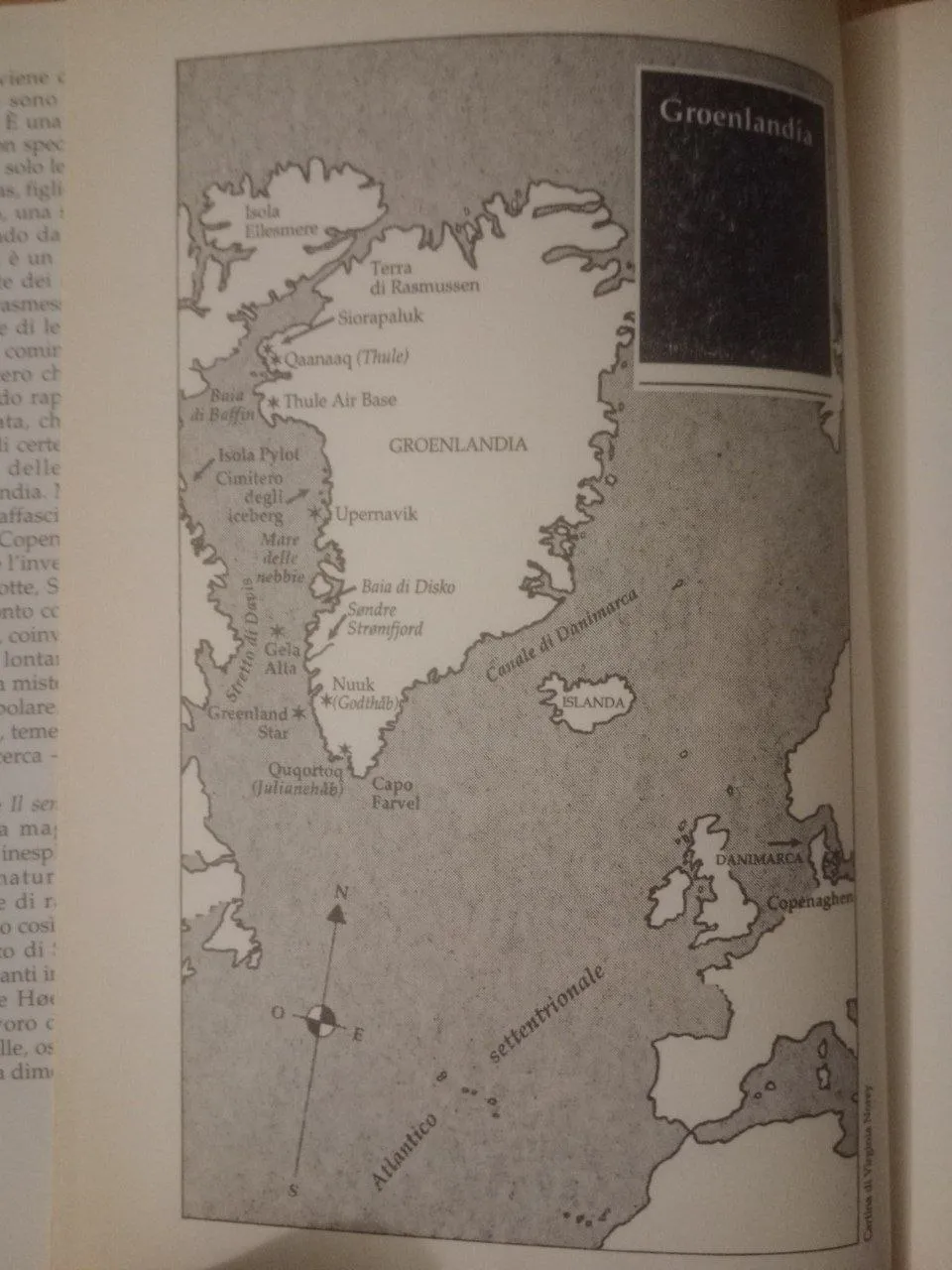
On the one hand you have mainland Denmark and Copenhagen and other one, separated by the ocean, the icy expanse of Greenland and its many islands.
Greenland has surely been on the thought of some lately and I'll leave it up to the potential readers to decide wether or not parallels can be drawn between current events and the subject matter of this book.
Regardless, it's not just water that divides these two very different parts of the same nation.
Throughout the story there's this strong contrast between the two and the medium for this tension is Smilla, who is losing her identity but firmly trying to hold on to her values without ever being fully integrated in Denmark.
If there was one simple guideline or equation to help us navigate this theme it would teach us that modernity has not come without its costs and the greed of western society, embodied by several different characters and organizations in this book, can corrupt even something as pure and primal as Greenland. It leaves people void and directionless, turning to all kinds of different things in life for some meaning but it's rarely for the best.
If you see the various characters through this lens you can get an idea of what the author might or might not value in life and what he's critical of as they're all quite different and they seem to be collectively called upon to represent Danish society with their faults and vices.
A lot of this is well condensed in the following sample.
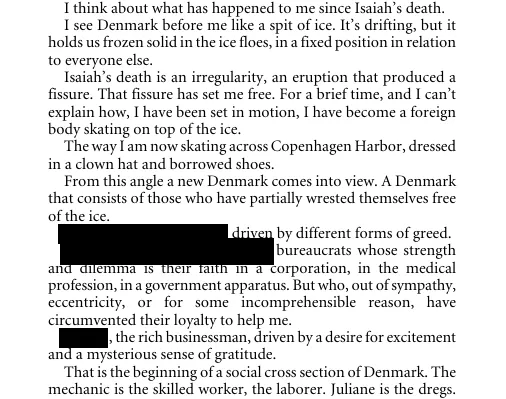
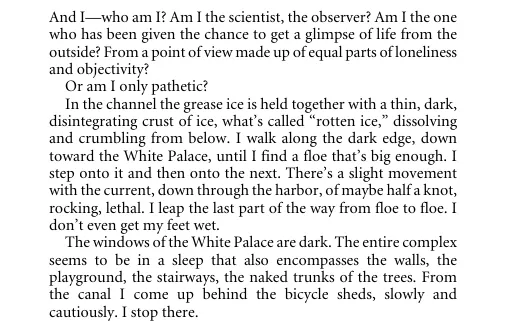
The picture painted is never entirely bleak but nevertheless judgmental of modern western society.
Copenaghen is never quite the european capital filled with beauty and splendor we might expect, it's not really presented under that light.
It's a somewhat decadent portrait of a city. A lot of time is spent along the docks and piers, at night. Smilla will relish in the freezing cold, longing for the sea and her native country.
The story will zig-zag and take us on winding roads, from the apartments of rich people to casinos and corporate offices.
From Esajas's mother, turned to alcoholism, to the many ill-conceived and profit-driven scientific expeditions to a remote corner of the world; everything can be seen under this lens of a critique of progress and modernity in the face of the fundamental values of human life.
The protagonist progressively descends into a web of lies, a world populated by double agents and their plots. There's a point where they can hardly decipher Smilla, as if they couldn't grasp the notion of a person doing something out of self-interest.
Smilla, as a character, contrasts all this. Love and duty inspire her to risk her life to find out the truth. There's a sadness to her, almost like a caged animal in a zoo.
Yet she never gives up. She's a resolute and independent woman. She's not afraid of getting her hands dirty if it comes to it. She's almost the personification of this fierce and primitive land.
Lastly, there's some sense of contempt and annoyance for technology that surfaces every once in a while during the story.
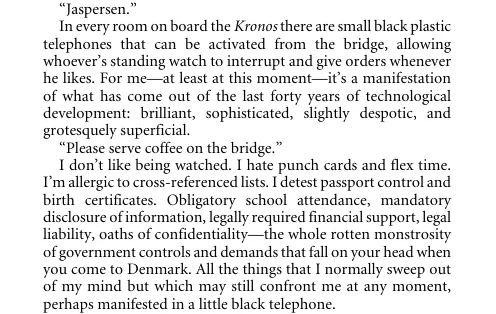
The same sort of sentiment can be found in this funny passage as well.
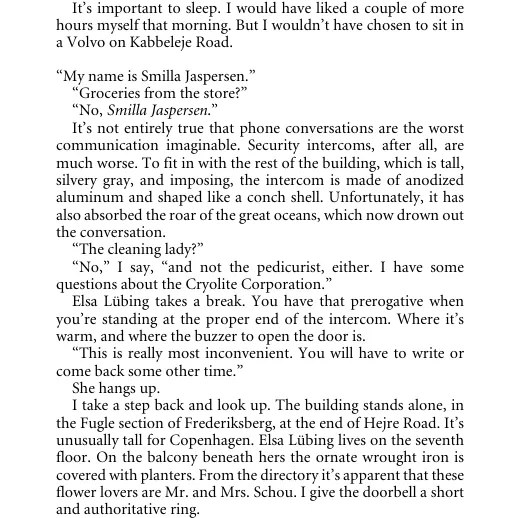
Here there's an emphasys on communication and structured society but the critique goes much further than that. Just imagine Smilla has received some higher education and many of the other characters are doctors and scientists of various kinds but they're all invariably pathetic and tragic figures, in some way. They don't ask the right questions and rarely have the right answers.
This culminates when, in the second half of the story, in Greenland we're presented with the sad spectacle of ports and giant docking stations scattered throughout the pure arctic lands ready to transport to Europe the riches extracted from the soil of this land. At this point Høeg puts the following words in the mouths of his characters.
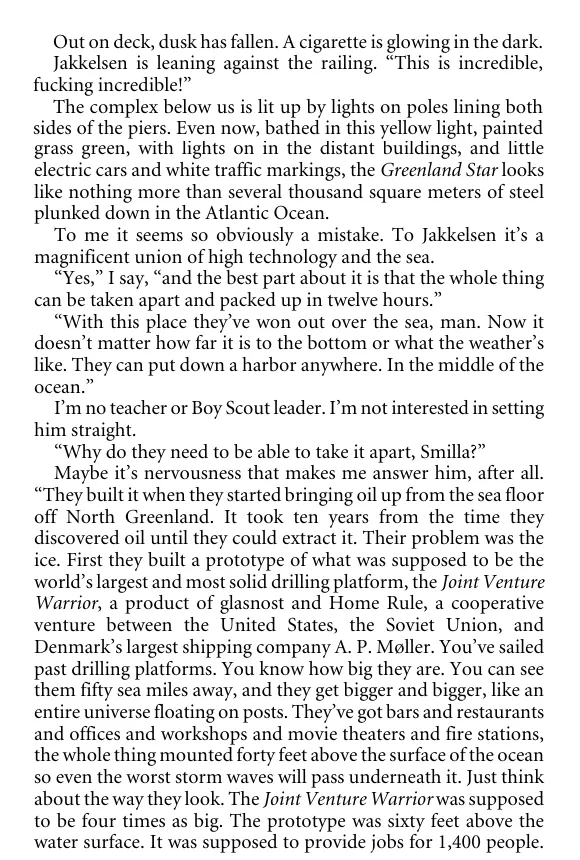
Conclusions
Ultimately the book operates on two levels. On the surface it's just a thriller but like all great genre fiction it operates on a deeper level too. Hopefully I've done a good job of giving you an idea of what that might be.
Overall I have mixed emotions over the book. In order to write this review I went back and experienced some of my favorite passages a few more times.
While there's a lot to like in it, the book never grabbed me as viscerally as I was hoping.
The premise is great and there's a few pivotal moments when the pace picks up but it took a bit too much to get there. 👎
If you're expecting a tightly written thriller this may not be the best book for you.
It's perhaps only under the guise of a suspense story that Smilla, as a book, fails.
There's twists and turns, some more predictable and believable than others.
Don't get me wrong! It was compelling at times and the way it was all wrapped up in the end was satisfying enough for me. I just don't think you should try to read this book expecting it to succeed entirely on a suspense level.
There's many names and facts you have to keep in mind. Every once in a while you'll be able to get a complete picture of all the people involved in the conspiracy but it's still quite tricky to follow, at times.
Among other things, there's something a bit annoying about Smilla as a spy and detective.
It's never quite clear how she knows to do certain things so well.
At some point or another our heroine will take a beating or two yet she always endures, almost unexplicably. Some readers might be put off by that.
There's some plot points that might have been designed as big twists but the story almost operates through lie and omission in order to get there so they didn't quite have an effect on me.
The ending of the story is also somewhat open and leaves much to your imagination.
Personally I found it cathartic, especially considering what the book is ultimately about.
However the arch of Smilla will not exactly conclude in a well defined way.
I think it's important to mention since some people might care about that.
I didn't go in with particular expectations or particularly specific preconceived notions about it.
Ultimately I think it's an imaginative and entertaining book. If you go in understanding its strenghts and weaknesses you might have a better experience than me.
For this reason, if it sounds interesting to you take a chance on it!
It's a book that was at some point quite the sensation and even though it has fallen out of flavor over the years it might still be well liked by some, as long as you're looking for more than just a thriller and you can take the good with the bad.

Colorado Kid 🔎📝
About the author
Stephen King is truly someone that needs no presentation.
"He lives with his wife Tabitha in his house in Maine.." and all that.
He will always be remembered fondly by me as some of the first books I naturally picked up as a teenager were his ( I started with "The Stand") and I'll be sure to read more of his fiction, in due time.
"Colorado Kid" was published in 2005 so it was created and finalized in what could be considered already as the more mature stages of this author's prolific carreer which started in 1974 with "Carrie". 👿
About the book
This is a rather short book and I've read it in a few hours, for this reason I will be concise.
At it's heart this is a story about a story.
The wider narrative device deals with Stephanie, a recent graduate and aspiring journalist.
She is mentored by Vince and Dave, two senior writers who are fond of her and try to impart to her some of their knowledge.
The trio works for a modest local journal serving a small town on an island in Maine (where else, if not there?!) and as the story starts they meet with an outsider working on his own article about obscure disappearances, crimes and their investigations.
They list all the crimes that have been carried out over the years on the small island and through this quick and episodic recollection we get to know in a more intimate manner this peculiar town.
It's the sort of place where everybody knows everybody and nothing ever happens so that boredom often fans the flames of gossip.
Some of these stories are picturesque and at the same time there's some sense of mundane banality about them.
Later Vince and Dave admit to Stephanie to having omitted on purpose one story from the conversation with the other reporter as they deemed it might not have been of interest to him and the audience of a journal from a major city.
The story in question is that of "the Colorado kid", an unsolved and quite dated mystery, and the rest of the book is framing device for this puzzling enigma.
The two writers tease Stephanie with their recounting of this event and the investigations that followed.
As a word of warning, the book does not provide a fulfilling ending to this story and what exactly happened to the Colorado kid remains, ultimately, uncertain so much to the characters as to the readers.
This is quite provocative work from the King as that was very clearly what he set out to do with this short story, among other things. He must have been fascinated by the idea of writing something that proves that people can't be pleased by stories that don't have a clear beginning and an end.
A fine exercise in meta writing that conveys through a simple story what could have otherwise been quickly summarized in a short essay or opinion piece.
We, as readers, fall in the same trap that also ensares the characters. Being doomed to not knowing and having to live with it.
As you can imagine there's not much to spoil in this story but I tried, anyway, to keep my description of it as vague as possible in case some of you might want to read the story for yourselves.
Twenty years after the fact, I'd say we're still collectively as fascinated by mysteries and the lives of others as in 2005. If not more. Just think of all the true crime content that it's out there. I consume my fair share too.
In general it's easy to surmise that the tastes of people when it comes to such stories have not changed. Those with a logical sequence that lead to a precise conclusion are the ones that interest us the most, by far. When this is impossible we'll tell ourselves the story we want to hear anyway and this notion is nicely exemplified by the following passage, to my mind one of the most important ones in the book.
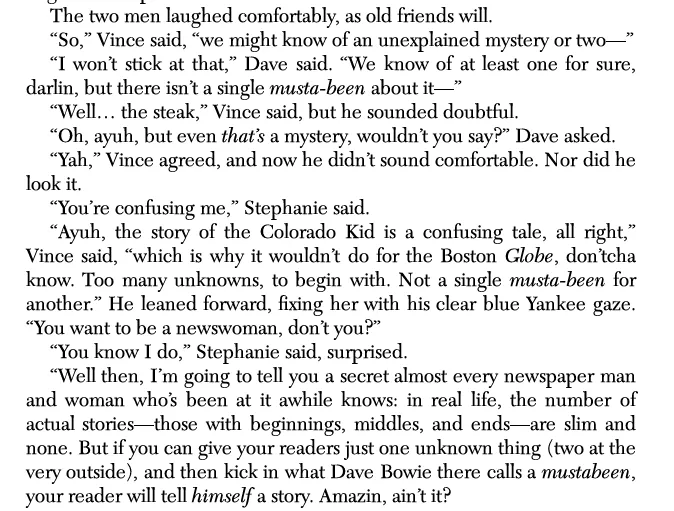
After having read this book I will try to refrain from judging too quickly articles and stories.
We should strive to just look at the facts with a critical mind and avoid wanting to hear the story we've already made up in our minds.
Conclusions
I started reading this book with no idea whatsoever of what it would be about.
It's the way in which I like to consume most of fiction.
I definetely wasn't expectly this kind of book from Stephen King, who's proved himself largely by just writing suspenseful and scary stories. This is a much more grounded work by him where he provides his two cents about what storytelling and journalism are about.
Going in with a more precise guideline and expectations I would have experienced the book differently.
I'm not sure how I should judge it as this is clearly not aiming to be a novel or piece of fiction in the more traditional sense and maybe I should leave it as that.
Otherwise, if I should rate it as just a cheeky thought experiment by King it would pass with flying colors.
As a story, not so much. It's not what it was supposed to be.
Stephen King does a good job of populating this small island community with people we feel we might have known for a long time considering it's a very short book. However I found the framing device a bit annoying once the main story gets going and whenever it resurfaces I felt its style was a bit sterile.
Hopefully this review serves as a caution for the potential readers.
Now you'll be more informed as to what exactly expect from this peculiar book and you'll be able to decide for yourself it it's something you might be interested in.
Parting words
Overall, I hope you found my blog post informative and fun to read.
It took me a while to write all this down and I would love to receive some feedback, wether these books were already on your radar or not. It would really mean a lot to me to know that some people took the time to read my thoughts. Feel free to interact with me in the comments if you have questions or feedback. 🤗
It takes time to read books over and over, take notes and ultimately share your opinions. ⌚️
Even still, I'd like to do this more often in the future. I read some books and I will go over many more in the future. 😎
As a reader, I almost exclusively enjoy fiction. I always found it fascinating.
Of these three books, the one by Sally Rooney was bought on a traditional retail store while the others were acquired from thrift shops and such.
A clean new book is nice but used books are much more affordable and even though they're usually a bit worn out they have more character and it's easier to show them love by ear-dogging them and the likes. Buying used books gives purpose to something that was supposed to be virtually endlessly reusable anyway and you always have to wonder about the previous owners and what kind of journey they had.
As all these books were in my native italian I decided to provide the relative excerpts you saw above sourcing them from the english versions of these books that I could find online in order to cater to the widest possible audience. If people are interested, in the future I will provide both versions.
Finally, I'd leave you with my TBR. Like all readers I have a nasty tendency of collecting far more books than the ones I could realistically read. It's an irresistible tentation but I'm trying to behave and limit my spending. However I do still have quite the pile. I will write the most notable titles down to give you a better idea of what I like to read and once again I will invite you to let me know what you think about them and wether or not they might inspire you with some suggestions.
"Those who walk away" by Patricia Highsmith
"This Sweet Sickness" by Patricia Highsmith
"Catch 22" by Joseph Heller
"The Master and Margarita" by Michail Bulgakov
"The Lord of the Flies" by William Golding
"The Tin Drum" by Günter Grass
"The Luck of Barry Lyndon" by William Thackeray
"Atonement" by Ian McEwan
"Cat and Mouse" by Christianna Brandt
"The Thursday Murder Club" by Richard Osman